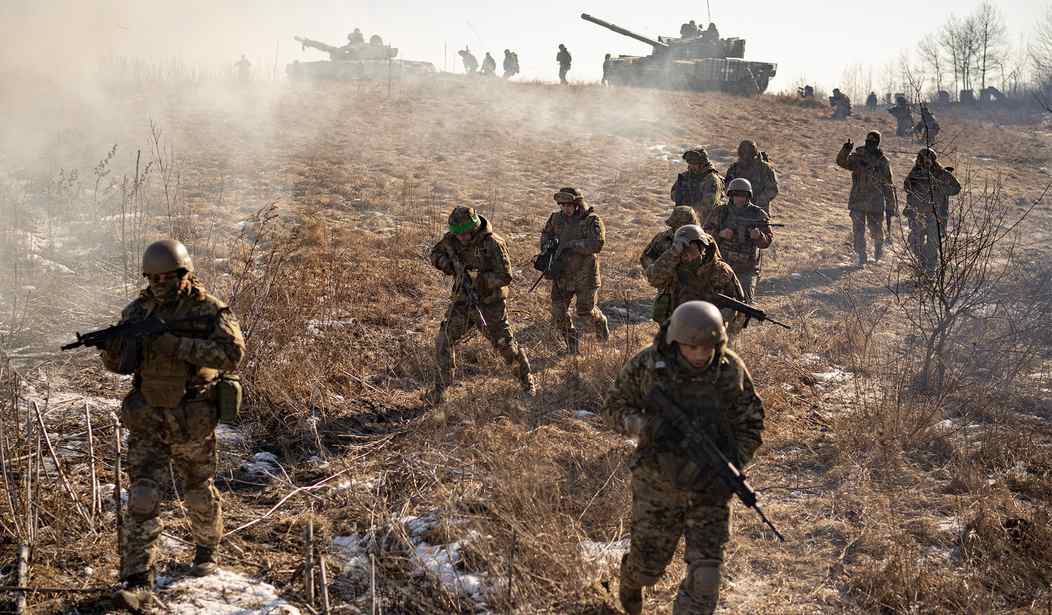There might be the first light coming through the door to peace in Ukraine that both sides slammed shut shortly before the war began.
Waging peace is never easy, but the Ukraine War might be particularly tricky. On the one side, you have a country that wants to annex or subjugate 100% of its neighbor. On the other, you have a country that wants the invaders 100% out. Then there are the parts of the invaded country — Crimea, Donbas — who’d rather be part of the invading country.
Complicating things further, while both peoples are generally decent, well-educated, and hard-working, both governments fairly well suck. Kyiv is generally corrupt and inept, and Putin’s Kremlin is corrupt and basically evil.
Then you have the complex history of Ukraine’s centuries-long subjugation under Russia’s boot (including the Holocaust-size Holodomor against Ukraine in the 1930s), that Ukrainians can’t afford to risk again. And you have Russia, with dreams of restored imperial glory, starting with subjugating Ukraine once more.
If all that didn’t make peace in Ukraine seem hopeless enough already, the current war (which really began in 2014) has seen such atrocities that attitudes have hardened and turned more bitter than ever.
Nevertheless, Kyiv has opened that door just a tiny crack, indicating that they might be willing to put Russian-held Crimea (illegally seized in 2014) on the negotiating table. “Kyiv is willing to discuss the future of Crimea with Moscow,” Ukraine President Volodymyr Zelenskyy’s deputy Andriy Sybiha told Financial Times, “if its forces reach the border of the Russian-occupied peninsula.”
This is the first time since 2014 that anyone in Kyiv has said that anything less than a complete Russian withdrawal to the internationally recognized borders of 1991 would be acceptable.
There are caveats. Three, in fact.
The first is that talks are contingent on a successful counteroffensive across the Dnipro River that separates the current southern front line from Crimea and the half of Kherson Oblast (region) still held by Russian forces. “If we will succeed in achieving our strategic goals on the battlefield and when we will be on the administrative border with Crimea, we are ready to open [a] diplomatic page to discuss this issue,” Sybiha said. If Russia throws as much cannon fodder into Kherson as they threw into Bakhmut, big Ukrainian gains seem unlikely.
The second is that even if Kyiv succeeds in forcing the Dnipro and pushing the Russians back to Crimea, taking Crimea is widely regarded by Western analysts as unlikelier still. Reports of Moscow fortifying the peninsula against attack go back to last summer, and the land route into Crimea proper is narrow and easily defended.
The third caveat is that Sybiha’s statement might be a ruse, a way to draw Russian defenders away from the Donbas region in the east to Kherson in the south.
However, with the heavy losses both sides have taken in Bakhmut, Sybiha might also be indicating to third parties — Washington and Beijing — that it’s time for the major powers to get serious about waging peace and that Kyiv would be receptive. Diplomatically, that might be a smart way to further isolate Russian strongman Vladimir Putin.
The Biden Administration has shown zero interest in working the peace process, but Beijing has. As I’m writing this, there’s a “geopolitical coup” [VIP link] going on in the Middle East, where China has “orchestrated a meeting in Beijing between the two Muslim powerhouses” Saudi Arabia and Iran. The China-sponsored summit comes on the heels of Beijing getting the two countries to reestablish diplomatic relations.
If Washington sits this one out, as it seems likely to do, postwar Ukraine might very well end up in China’s orbit.
Winston Churchill noted that “jaw, jaw is better than war, war,” but now that Kyiv is indicating it might be ready to seriously talk, we’ll see if our own government is willing to listen.
Recommended: You Won’t Believe the Most Outrageous Claim in the Trump Indictment










Join the conversation as a VIP Member